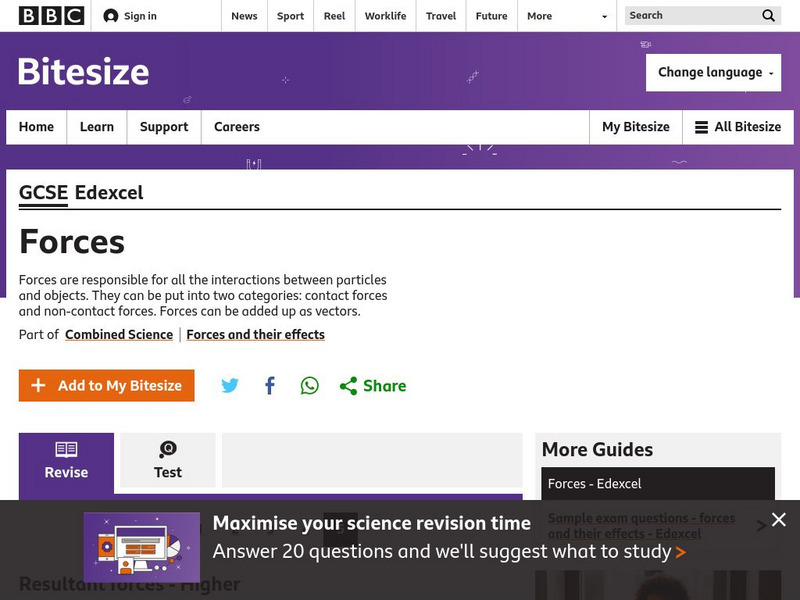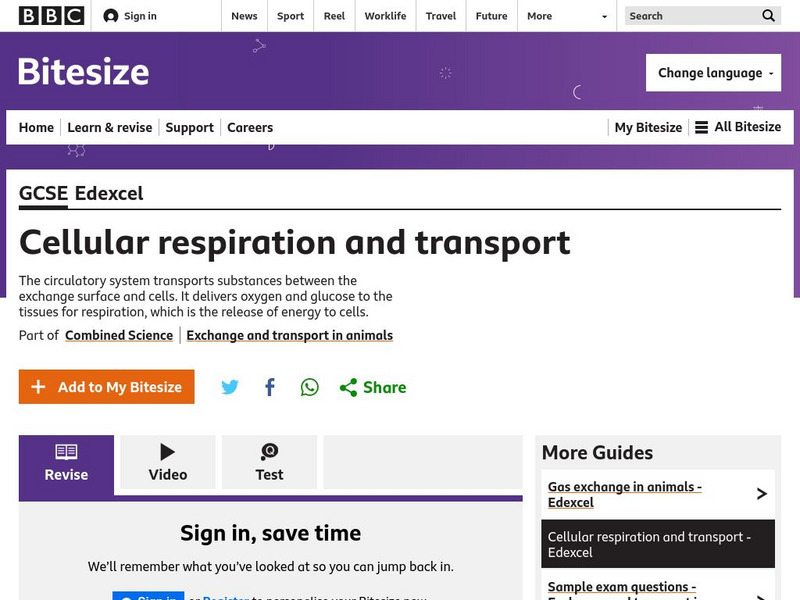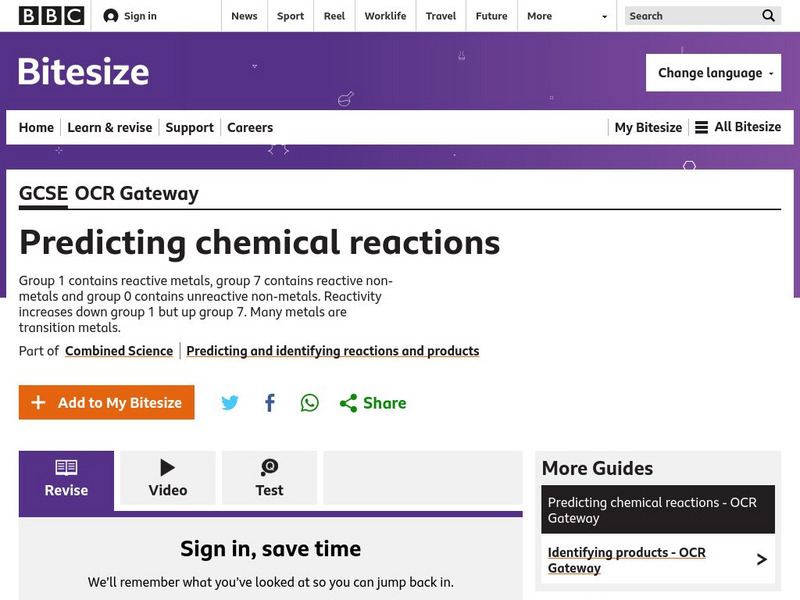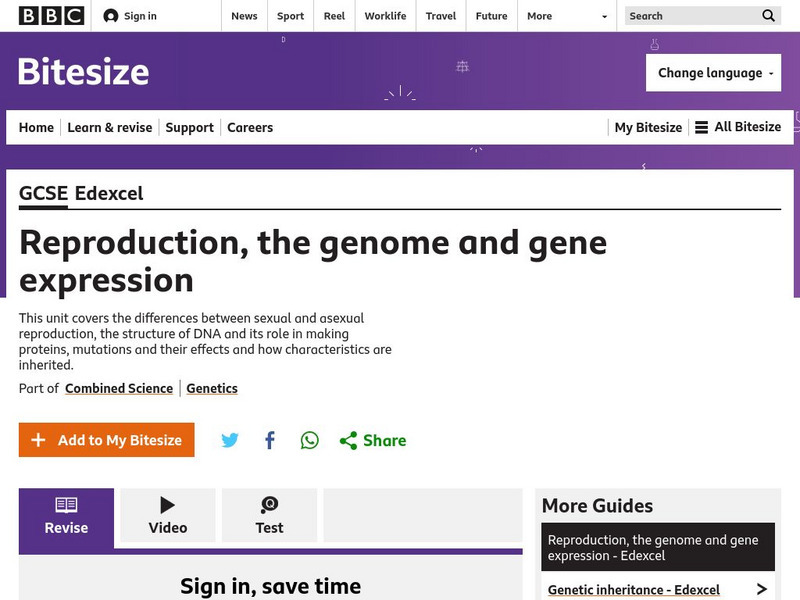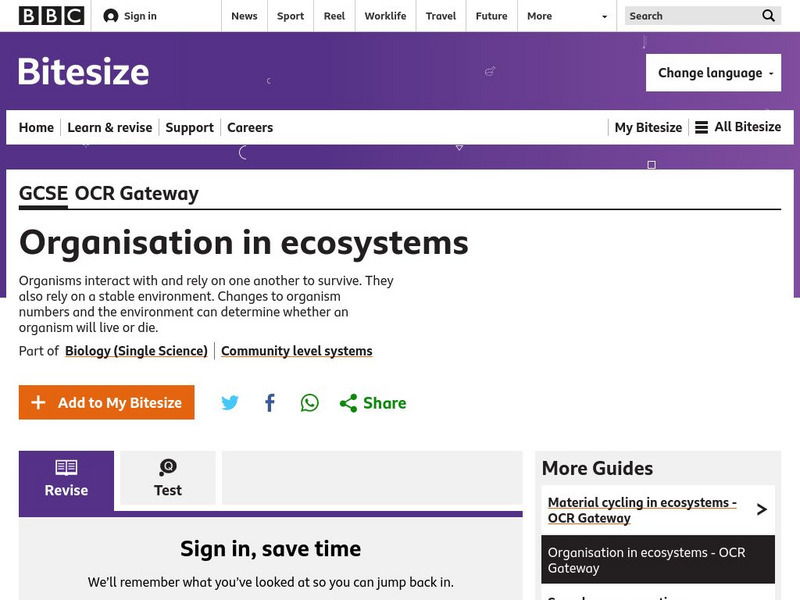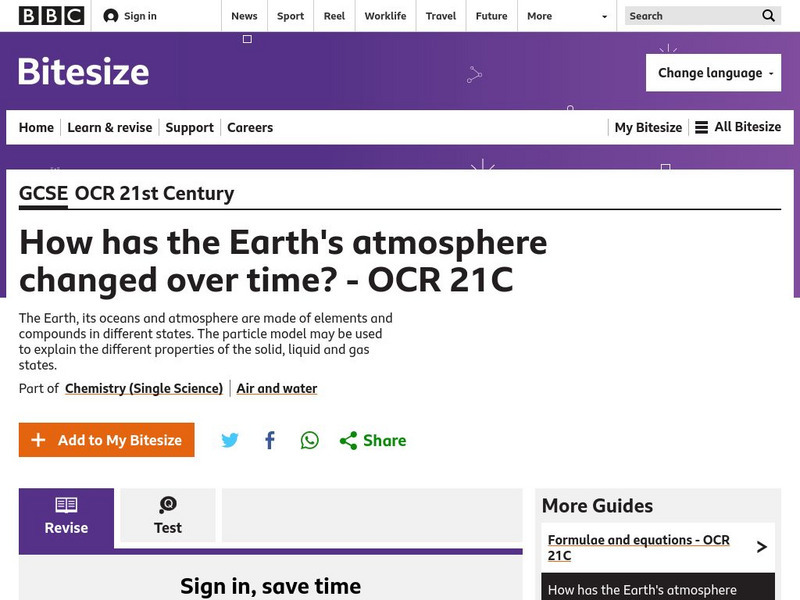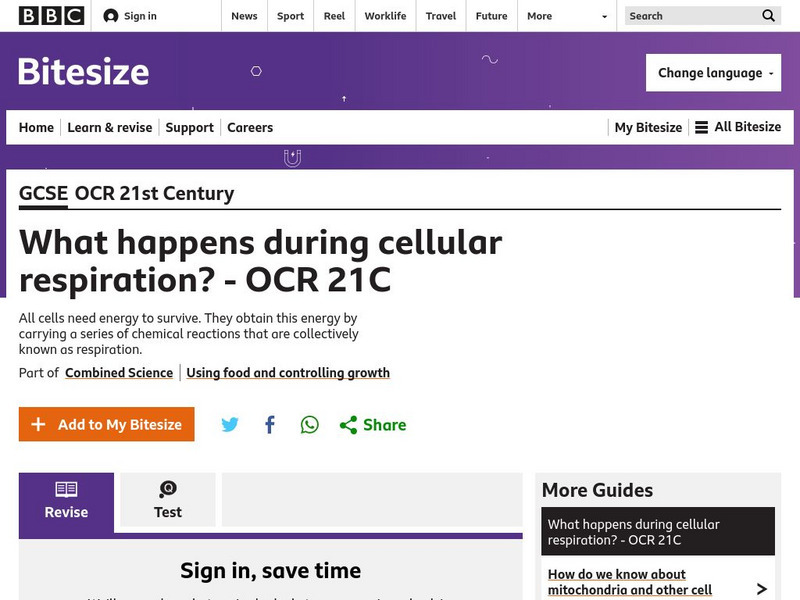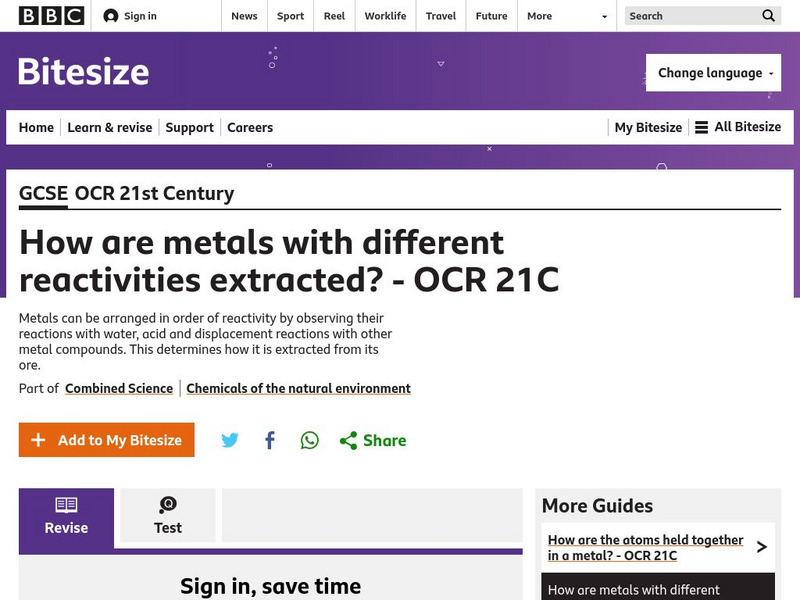BBC
Bbc: Gcse Bitesize: Forces
Forces are responsible for all the interactions between particles and objects. They can be put into two categories: contact forces and non-contact forces. Forces can be added up as vectors.
BBC
Bbc: Gcse Bitesize: Cellular Respiration and Transport
The circulatory system transports substances between the exchange surface and cells. It delivers oxygen and glucose to the tissues for respiration, which is the release of energy to cells.
BBC
Bbc: Gcse Bitesize: The Korean War
Learn about and revise the Korean War with Bitesize GCSE History.
BBC
Bbc: Gcse Bitesize: Motion
This lesson focuses on motion including definitions, how to calculate the change in velocity and the average acceleration, and a link to an assessment.
BBC
Bbc: Gcse Bitesize: Types of Chemical Reactions
This lesson focuses chemical reactions using acidic and alkaline solutions, the pH scale which measures the acidity or alkalinity of a solution, and how to use a pH meter. A link to an assessment is also provided.
BBC
Bbc: Gcse Bitesize: Predicting Chemical Reactions
This lesson focuses on predicting chemical reactions using The Group 1 elements in the Periodic Table are known as the alkali metals. They include lithium, sodium and potassium, which all react vigorously with air and water. It provides...
BBC
Bbc: Gcse Bitesize: Making Fertilizer
This lesson focuses on fertilizers including how they replace nitrogen, phosphorus and potassium in the ground; how the plants get the nutrients; a table showing examples of fertilisers, their formula, and the essential elements they...
BBC
Bbc: Gcse Bitesize: Newton's Second Law
This lesson focuses on Newton's Second Law including the formula Force = mass to the x power acceleration, an example of how to calculate the force needed to accelerate based on mass, and a link to a test.
BBC
Bbc: Gcse Bitesize: Combined Science
This site offers links to six different exams over courses studied in GCSE Bitesize. They include AQA Synergy, AQA Trilogy, Edexcel, Eduqas, OCR 21st Century, and OCR Gateway.
BBC
Bbc: Gcse Bitesize: Reproduction, the Genome and Gene Expression
This lesson focuses on DNA including it's structure,components,and how it goes together to form genomes. It also provides to links to a video and a test.
BBC
Bbc: Gcse Bitesize: Controlling Chemical Reactions
This lesson focuses on comparing the reaction rate of chemical reactions with different surface areas.
BBC
Bbc: Gcse Bitesize: Bonding: Covalent Bonds
This section of the lesson module focuses on covalent bonds, which are formed between non-metal atoms that share a pair of electrons. It includes links to a video and a test. Other types of chemical bonds are covered elsewhere in the...
BBC
Bbc: Gcse Bitesize: Organization in Ecosystems
This lesson focuses on food chains in ecosystems, including levels of consumers, decomposers, and a list of common words used with food chains and their definitions. It also provides a link to an assessment.
BBC
Bbc: Gcse Bitesize: Mitosis and Cell Specialisation
This lesson focuses on cloning. Plants can make identical copies of themselves by asexual reproduction, for example by tubers and runners. Humans have been cloning plants for years and have recently started to develop techniques to clone...
BBC
Bbc: Gcse Bitesize: Enxymes
This lesson focuses on enzyme-catalysed reactions and the effect of temperature, substrate concentration, and pH on the reaction rate. It provides a link to an assessment.
BBC
Bbc: Gcse Bitesize: The Challenges of Size in Animals
This lesson focuses on blood including it's functions including transporting materials around the body and protecting against disease. It explains the components of blood and the functions of each and offers a link to an assessment.
BBC
Bbc: Gcse Bitesize: Properties of Materials
This lesson focuses on the properties of carbon atoms in diamonds and graphite including their structures and bonding and their properties and uses. It also provides links to a video and an assessment.
BBC
Bbc: Gcse Bitesize: Material Cycling in Ecosystems
This lesson focuses on the carbon cycle which shows how atoms of carbon can exist within different compounds at different times and be recycled between living organisms and the environment. It also provides a link to an assessment.
BBC
Bbc: Gcse Bitesize: How Has the Earth's Atmosphere Changed Over Time? Ocr 21 C
This lesson focuses on ways to reduce air pollution from power stations and from automobiles. It provides a link to an assessment.
BBC
Bbc: Gcse Bitesize: Electrolysis
This lesson focuses on Electrolysis, the decomposition of a liquid using electricity. When ionic compounds are molten or dissolved in water the ions are free to move. It offers links to a video and a test.
BBC
Bbc: Gcse Bitesize: Purity and Separating Mixtures
This lesson focuses on different types of chemical substances, distinguishing between pure substances and mixtures, and changes of temperature based in substance. It provides a link to a test.
BBC
Bbc: Gcse Bitesize: Heat Energy Changes in Chemical Reactions
This lesson focuses on heat energy changes in chemical reactions. Exothermic reactions transfer energy to the surroundings. Endothermic reactions take in energy from the surroundings. It also offers links to a video and a test.
BBC
Bbc: Gcse Bitesize: What Happens During Cellular Respiration? Ocr 21 C
This lesson focuses on what happens during cellular respiration including how energy is released as APT and why organisms need energy in that form. A link to a test is provided.
BBC
Bbc: Gcse Bitesize: How Are Metals With Different Reactivities Extracted? Ocr
This lesson focuses on how metals with different reactivity are extracted including how it is extracted with ores, extraction methods, a table of metals and how to extract them, and an exercise concerning the extraction of zinc. A link...


